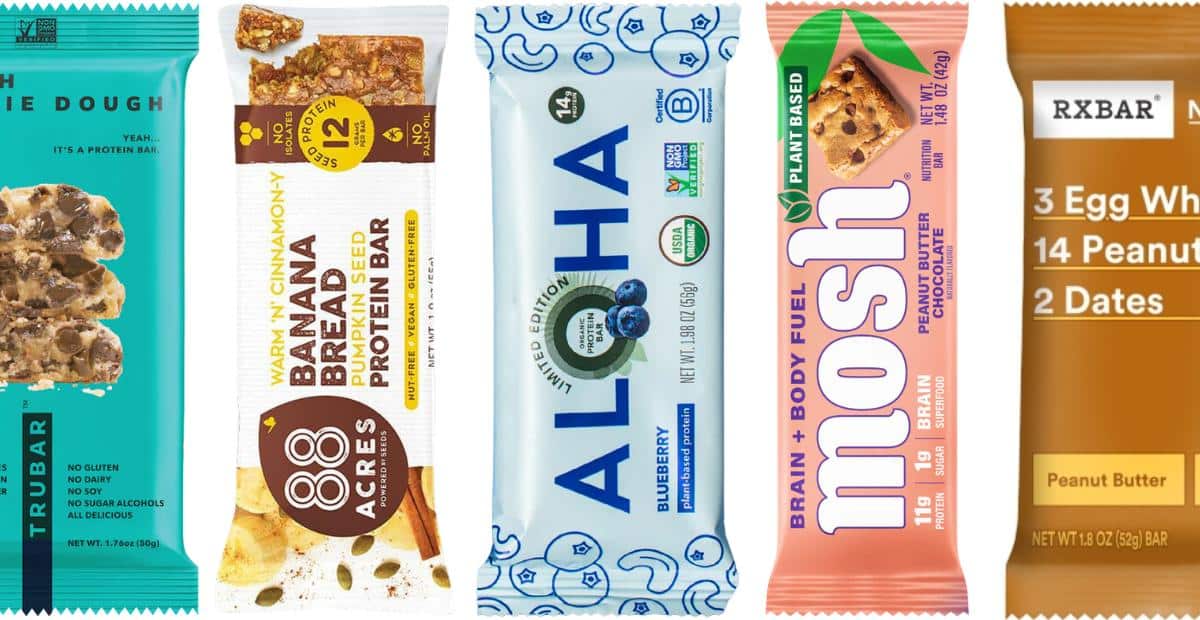Protein bars can be a convenient option for on-the-go snacking. But the large variety of protein bars on the market makes shopping overwhelming. I have reviewed every protein bar on the market so you don’t have to! Check out my top picks below for the best protein bars based on nutrition profile and ingredients.
How to select the best protein bar for your needs
There are a few key ways that protein bars differ from one another. Consider these nutrition differences before you shop and identify what your nutrition priorities are to help narrow down your options.
1. Balanced protein bar vs. protein only
If you’re looking for a balanced snack, the best protein bar will be one that contains a source of protein, carbohydrate, fibre, and fat. If you’re looking for a bar to boost your protein intake only, choose a bar with lower carbohydrates, fats, and with protein as the main macronutrient.
2. Sugar-sweetened vs. non-sugar sweetener
Protein bars are sweetened with either sugar, such as table sugar, honey, or syrups, or non-sugar sweeteners, such as sucralose, sugar alcohols, stevia, or monk fruit. Whether or not non-sugar sweeteners are a better option than sugar remains controversial. There is debate as to the impact of these sweeteners on our hunger & satiety cues, whether or not we overcompensate with more calories or sweet foods later in the day after eating non-caloric sweeteners, and the impact on gut microflora and weight.
In their 2023 guidelines surrounding non-caloric sweeteners, the World Health Organization suggests that in addition to reducing our intake of added sugar, we should limit our intake of non-sugar sweeteners. In short, they concluded that using non-sugar sweeteners in place of added sugar does not seem to support long-term weight loss or disease prevention. This means that simply swapping sugar in your diet for an alternative non-sugar sweetener will not necessarily improve your health.
If choosing a bar sweetened with non-sugar sweeteners, opt for one sweetened with monk fruit or stevia, as these are more natural alternatives to artificial sweeteners. If you prefer bars without non-sugar sweeteners, opt for one free from added sugars, or with less than 7g of added sugar per bar (or as close to this as possible based on what is available to you). I have included options for both of these scenarios in my list below. Note: the exception here is for individuals with higher-than-average nutrient needs seeking high-calorie protein bars as these will almost always contain a higher sugar content.
3. Ingredient list
Some protein bars have a very long list of ingredients with more additives which tend to be more processed, while others contain a shorter list with more whole-food ingredients (ie. ingredients that you would likely use if you were making a protein bar at home). Consider the quality of ingredients used when looking at the nutrition information on each label.
4. Protein source
Variety is best when it comes to protein sources in your diet. Protein bars can help add variety to your diet by including protein sources you may not otherwise consume regularly. For example, someone who typically consumes animal-based protein may benefit from choosing a plant-based protein bar.
When comparing protein bars, keep in mind that the majority of protein in your diet should come from whole food sources and not protein bars. The protein bar you choose will ideally contribute only a small percentage of protein to your total diet. With this in mind, consider the flavour, texture, and overall nutrient profile of the bar to select the option thats best for your overall needs.
10 Best Protein Bars That are Dietitian Approved
A note from me before I get to my top 10 list. I try to keep this post updated, but the protein bar category is constantly changing. Protein bars appear and disappear from the market, and product formulations change. Always check product packaging for up-to-date nutrition and ingredient information before consuming.
I have carefully vetted each protein bar included in this list. Each bar has been selected as “best” based on its ingredients, nutrition profile, and relative to others on the market. By nature, protein bars are a processed food item and are not a replacement for whole foods in your diet. Aim to get protein in your diet from a variety of sources (meat, legumes, etc.), and use protein bars to supplement your diet when this is not possible.
Lastly, Real Good Eats is reader supported. When you buy through links on our site, we may earn an affiliate commission, at no additional fee to you. Thank you for your continued support!
1. Aloha Bars
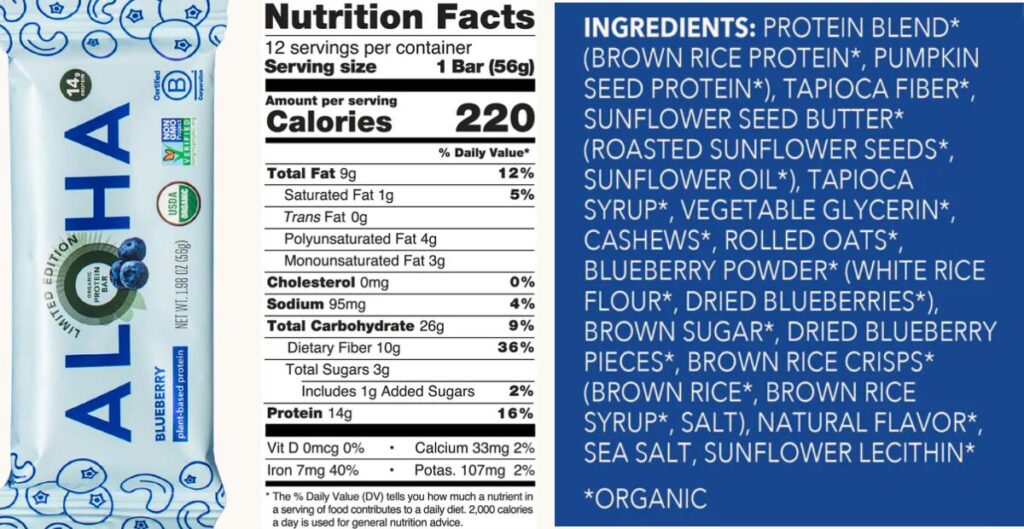
Aloha bars have a balanced macronutrient profile, with 12g of protein from brown rice and pumpkin seeds. They are a source of unsaturated fats from nuts and seeds and sweetened with monk fruit and less than a teaspoon of sugar. You can buy Aloha bars here (USA) and here (CAN).
Aloha Nutrition Facts Summary:
Calories: 220-260
Fat: 8-13g
Carbohydrate: 24-27g
Sugar: 4-5g
Fibre: 10g
Protein: 14g
2. IQ Bars
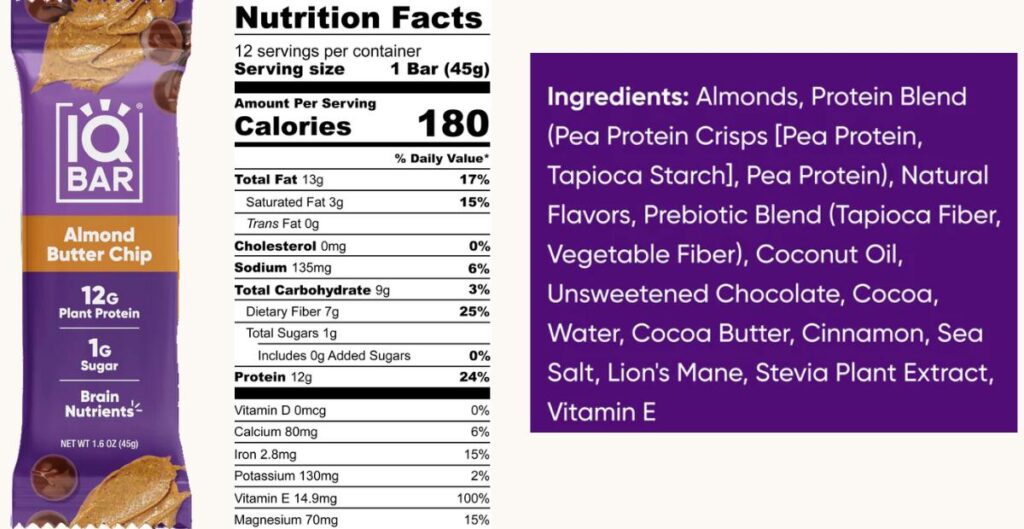
IQ Bars are a lower carbohydrate and sugar option made with a blend of nuts and plant-based protein. With 12g of protein per bar, they are free from added sugar and sweetened with stevia. You can buy IQ bars here (USA) and here (CAN).
IQ Bar Nutrition Facts Summary:
Calories: 160-180
Fat: 10-13g
Carbohydrate: 9-12g
Sugar: 1-2g
Fibre: 6-9g
Protein: 12g
3. Simply Protein
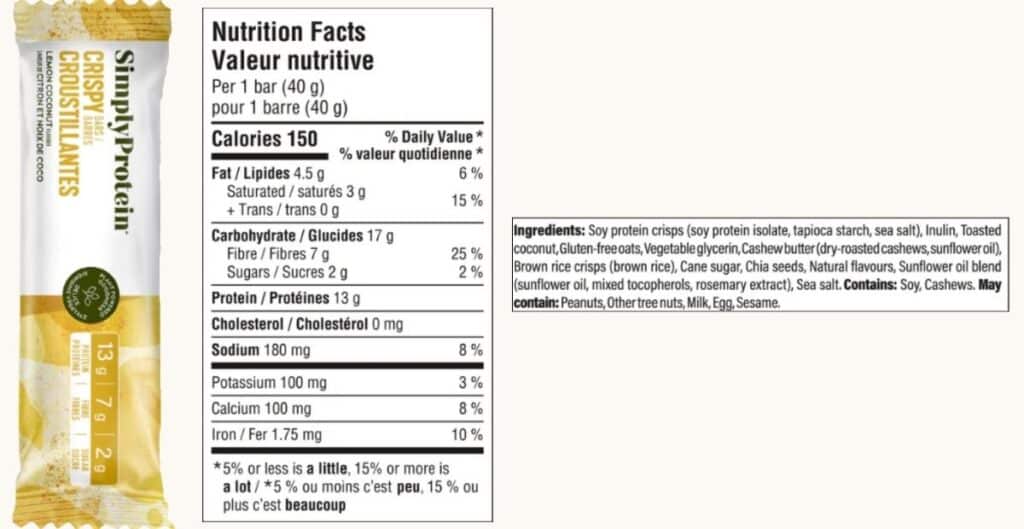
Simply protein bars are low in sugar, with other 1-2g per bar. They are also a good source of protein and fibre, with 13 and 7g, respectively. Check out my full Simply Protein bar review for more information. You can buy Simply Protein bars here (USA) and here (CAN).
Simply Protein Nutrition Fact Summary:
Calories: 150
Fat: 3.5-4.5g
Carbohydrate: 16-17g
Sugar: 1g
Fibre: 7g
Protein: 15g
4. Sprouted Protein Bar
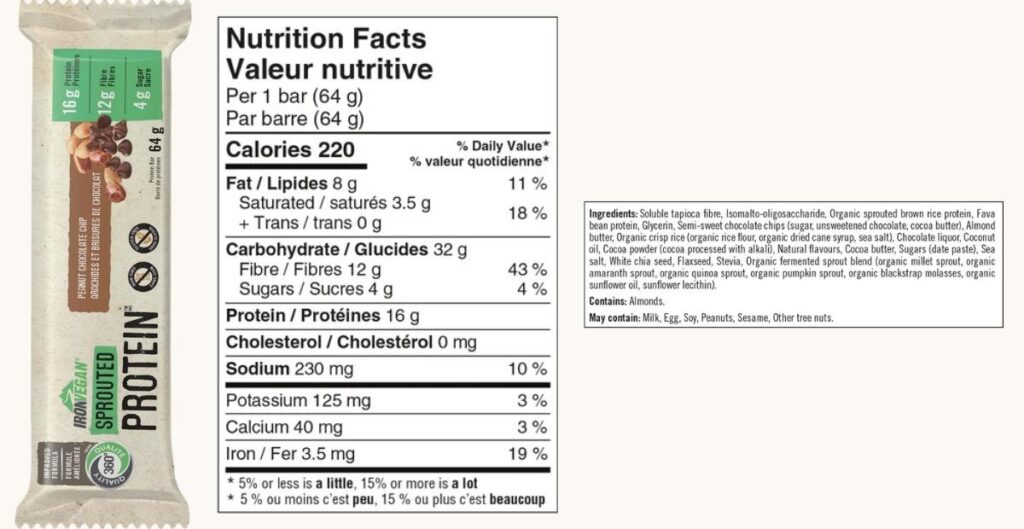
Sprouted protein bars are made with brown rice and fava bean protein. They are high in fiber and contain 16g of protein. They are low in sugar, with 4g per bar, and sweetened with stevia. You can buy Sprouted Protein bars here (CAN only).
Nutrition Facts:
Calories: 220-230
Fat: 8-9g
Carbohydrate: 29-32g
Sugar: 3-4g
Fibre: 16-17g
Protein: 15g
5. RXBAR
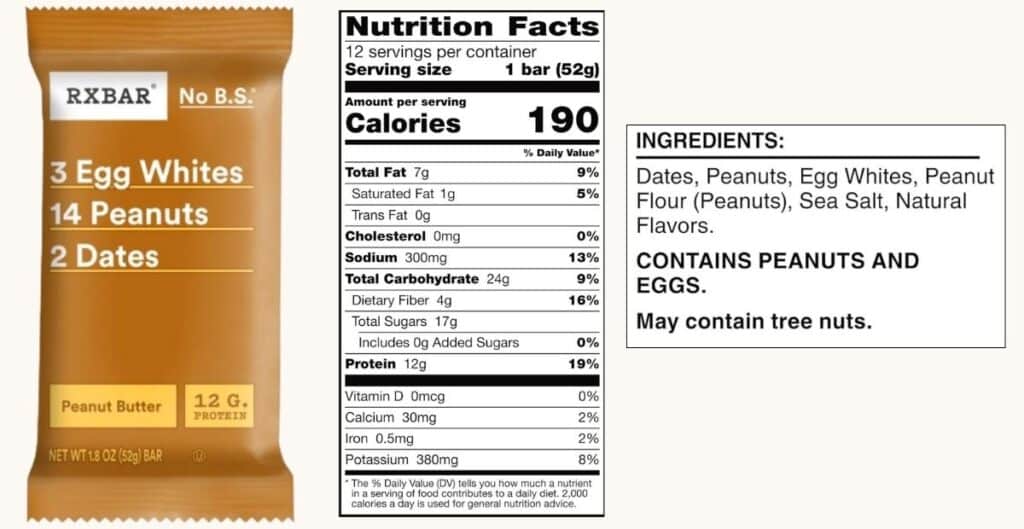
RXBARs contain fewer ultra-processed ingredients compared to other protein bars on the market. They provide 12g of protein from egg whites and unsaturated fats from nuts. Though they contain 13-17g of sugar per bar, they are free from added sugar. The sugar in RXBARs is from dates which have a low glycemic index.Read more about RXBARs in my full review. You can buy RXBARs here (USA) and here (CAN).
RXBAR Nutrition Facts Summary:
Calories: 210-220
Fat: 7-10g
Carbohydrate: 22-25g
Sugar: 13-15g
Fibre: 4-5g
Protein: 12g
6. TRUBAR
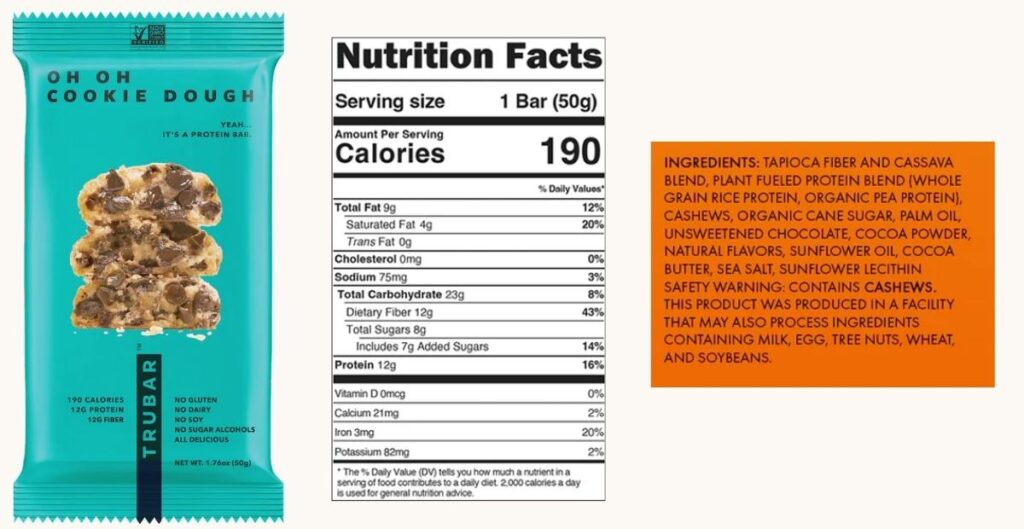
TRUBARs are made from a fibre and plant-based protein blend. They contain nuts and are sweetened with sugar. They provide 7-8g of sugar per bar, a moderate amount compared to other protein bars. These are a good option for those who prefer not to consume bars with non-sugar sweeteners. You can buy TRUBARs here (USA) and here (CAN).
TRUBAR Nutrition Facts Summary:
Calories: 190
Fat: 8-9g
Carbohydrate: 23-24g
Sugar: 7-8g
Fibre: 11-13g
Protein: 12g
7. 88 Acres Protein Bars
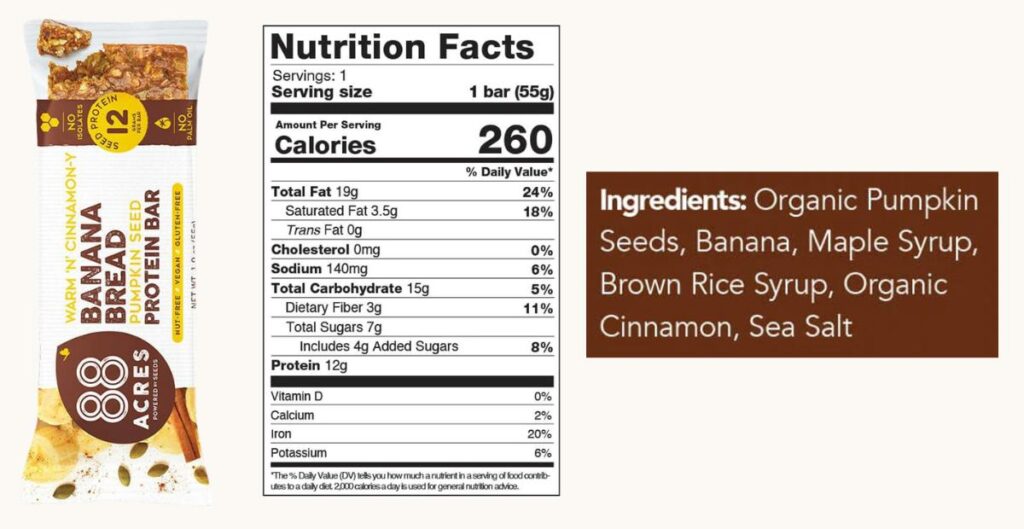
88 Acres protein bars are made from seeds, maple syrup, fruit, and spices. They are free from protein powders and provide a source of protein and healthy fats from pumpkin seeds. They are nut-free and are a great option for those with nut allergies. You can buy 88 Acres bars here (USA only).
For even more nut-free protein bar options, check out our nut-free protein bar list.
88 Acres Nutrition Facts Summary:
Calories: 260-280
Fat: 17-21g
Carbohydrate: 15-17g
Sugar: 7-10g
Fibre: 2-3g
Protein: 12g
8. Mosh Protein Bars
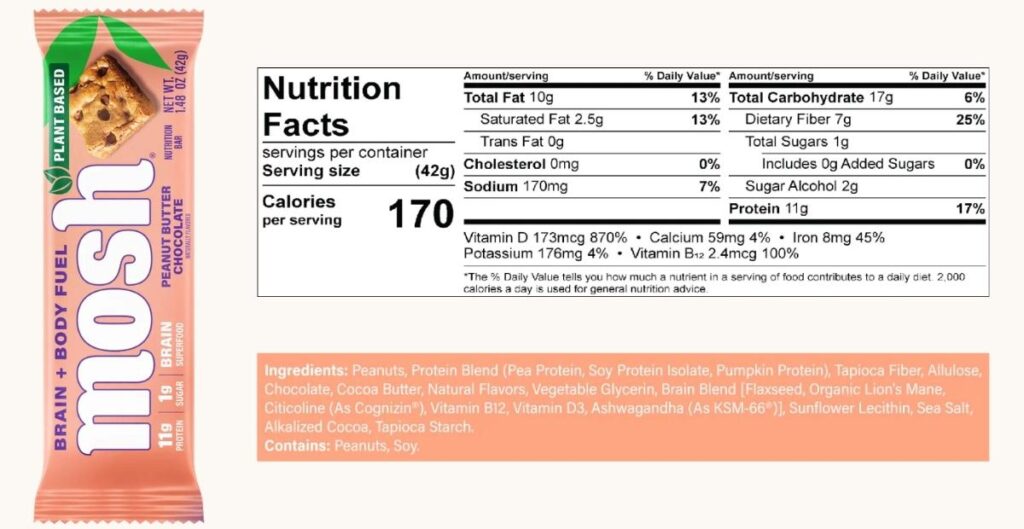
Mosh high protein bars are made with whey or plant-based and provide a source of unsaturated fats from flaxseed and nuts. They are also high in fiber and low in sugar. They are sweetened with agave, a small amount of erythritol (sugar alcohol), stevia, and monk fruit. You can buy mosh protein bars here (USA only).
Mosh Nutrition Facts Summary:
Calories: 160-180
Fat: 8-10g
Carbohydrate: 15-16g
Sugar: 3g
Fibre: 7-8g
Protein: 12-13g
9. No Cow Protein Bars
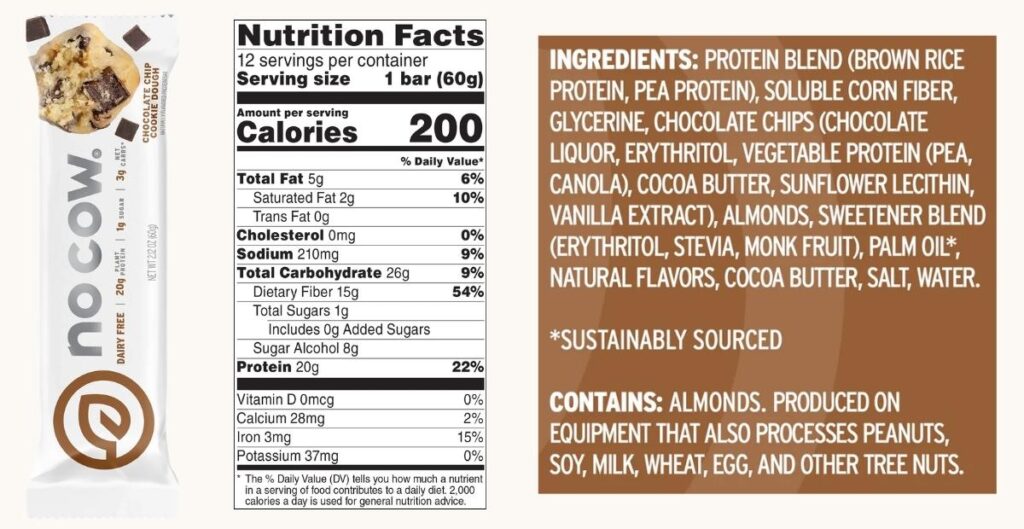
No Cow Protein bars contain 20g of plant-based protein from brown rice and peas. They are low in sugar, sweetened with 5-8g of erythritol per bar, stevia, and monk fruit. You can buy No Cow protein bars here (USA only).
No Cow Nutrition Facts Summary
Calories: 190-210
Fat: 4-7g
Carbohydrate: 24-26g
Sugar: 1g
Fibre: 14-17g
Protein: 20-22g
10. FEED Bar
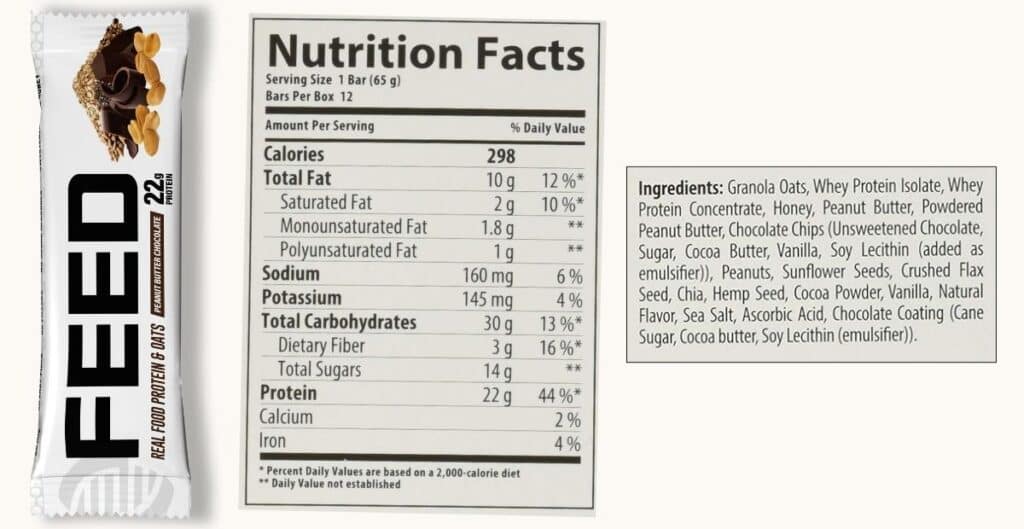
FEED bars are high in calories and protein and are suitable for those looking to gain weight or meet higher-than-average nutrient needs. Made from oats, whey protein, nuts and seeds, they contain fewer ultra-processed ingredients than other high-calorie and protein bars on the market. You can buy Nutrabolics FEED bars here (USA) and here (CAN).
FEED bar Nutrition Facts Summary:
Calories: 298
Fat: 10g
Carbohydrate: 30g
Sugar: 14g
Fibre: 3g
Protein: 22g
Want to see how your favourite protein bars compare to others on the market? Check out my Protein Bar Comparison Chart to sort protein bars by nutrients or search for the best option to suit your needs.

